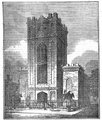John S. J. Gardiner
John S. J. Gardiner | |
|---|---|
 portrait by Gilbert Stuart | |
| Born | John Sylvester John Gardiner 1765 |
| Died | 1830 Harrowgate, England |
| Spouse | Mary Howard |
| Children | 3 |
| Parent(s) | John Sylvester Gardiner Margaret Harries |
| Relatives | John Perkins Cushing (son-in-law) Edward Gardiner (grandson) |
John Sylvester John Gardiner (1765–1830), aka John S. J. Gardiner, was an American Episcopal priest. He was Rector of Trinity Church, Boston, Massachusetts, president of Boston's Anthology Club, and active in the Boston Athenæum.[1]
Early life
[edit]Gardiner was born in Haverfordwest, to Dr. John Sylvester Gardiner (1731–1793) and Margaret Harries (1740–1786). His father served as Attorney General for the British government in the West Indies, where he spent much of his youth.[2] He was the grandson of Silvester Gardiner.[3]
He was in educated in Boston and England, where he was a pupil of the famous Dr. Samuel Parr.[4] Following the outbreak of the American Revolutionary War, he went back to England, only to permanently return to the United States in 1783.[2]
Career
[edit]Gardiner was for 37 years the "best-known and most influential Episcopal" clergyman of Boston.[1] Trained for the law, he turned to divinity and for 25 years was rector of Trinity Church, Boston. Despite this conservative bent, he was on very amiable sociable terms with his Unitarian brethren. George Ticknor studied Latin and Greek under Gardiner's tutelage.[5][6]
He served as president of Boston's Anthology Club and was active in the Boston Athenæum.[2]
Personal life
[edit]Gardiner was married to Mary Howard (1774–1848), who was born in Augusta, Maine, and was the daughter of Col. William Howard and Martha Howard.[1] Together, they were the parents of three children:[1]
- William Howard Gardiner (1797–1880), who was an 1817 graduate of Harvard College and who married Caroline Perkins (1800–1867), the daughter of prominent merchant Thomas Handasyd Perkins, in 1823.[1]
- Elizabeth Gardiner (b. 1798), who died young.
- Mary Louisa Gardiner (1799–1862), married John Perkins Cushing (1787–1862), a wealthy China opium smuggler, in 1830. The town of Belmont, Massachusetts, is named after their estate.[7]
Gardiner died in 1830 in Harrowgate, England.[5]
Descendants
[edit]He was the grandfather, through his son William, of Edward Gardiner (1825–1859), a prominent architect.[1]
Works by Gardiner
[edit]- "Epistle to Zenas." Exchange Advertiser, June 22, 1786.
- Remarks on the Jacobiniad (1795)
- A sermon delivered before the Humane Society, of the Commonwealth of Massachusetts. (1803)
- A sermon preached at Trinity Church, December 9, 1804, on the death of the Right Reverend Samuel Parker, D.D. Bishop of the Protestant Episcopal Church in the state of Massachusetts. (1804)
- A sermon preached at Trinity Church in Boston on fast day, April 7, 1808. (1808; Reprinted in The Port Folio, 1808)
- A sermon, preached before the African Society, on the 14th of July 1810: the anniversary of the abolition of the slave trade. (1810)
- A sermon, delivered at Trinity Church, Christmas Day, December 25, 1810, on the divinity of Jesus Christ. (1810)
- A discourse, delivered at Trinity Church, Boston, July 23, 1812 on the day of publick fast in Massachusetts, upon the declaration of war against Great-Britain. (1812)
- Life a journey, and man a traveller: A New-Year's sermon, preached at Trinity-Church, on January 4th, 1824, and, by particular desire, delivered again on January 2, 1825. (1825)
Image gallery
[edit]-
Illustration from J.S.J. Gardiner's Remarks on the Jacobiniad, 1795
-
Illustration from J.S.J. Gardiner's Remarks on the Jacobiniad, 1795
-
Monthly Anthology 1805
-
Trinity Church, Summer St. (1829 building). Illustration from American Magazine of Useful and Entertaining Knowledge
References
[edit]- Notes
- ^ a b c d e f Biographical Sketches of Representative Citizens of the State of Maine. Boston: New England Historical Publishing Company. 1903. p. 158. Retrieved 26 October 2017.
- ^ a b c "Reverend John Sylvester John Gardiner". www.bostonathenaeum.org. Boston Athenæum. Archived from the original on 26 October 2017. Retrieved 26 October 2017.
- ^ Webster, Henry Sewall (1913). Silvester Gardiner. Gardiner, Maine: The Reporter-Journal Press. pp. 8-9. Retrieved 13 April 2020.
- ^ Duyckinck, Evert Augustus; Duyckinck, George Long (1856). Cyclopaedia of American literature: embracing personal and critical notices of authors, and selections from their writings. From the earliest period to the present day; with portraits, autographs, and other illustrations. C. Scribner. Retrieved 26 October 2017.
- ^ a b Gardiner, John Sylvester John (1891). Our Illogical Distrust of England. Stedman and Hutchinson, eds. 1891. A Library of American Literature: An Anthology in 11 Volumes. Stedman and Hutchinson, comps. A Library of American Literature: An Anthology in Eleven Volumes | Vol. IV: Literature of the Republic, Part I., Constitutional period, 1788–1820. Retrieved 26 October 2017.
- ^ Boggs, Colleen G. (2010). Transnationalism and American Literature: Literary Translation 1773–1892. Routledge. p. 159. ISBN 9781135985905. Retrieved 26 October 2017.
- ^ "Cushing, John Perkins, 1787-1862.John Perkins Cushing business records, 1832-1882 (inclusive): A Finding Aid". oasis.lib.harvard.edu. Harvard University Library. Archived from the original on 15 July 2010. Retrieved 20 June 2017.
- Sources
- Lewis P. Simpson. A Literary Adventure of the Early Republic: The Anthology Society and the Monthly Anthology. New England Quarterly, Vol. 27, No. 2 (Jun., 1954), pp. 168–190.
- Quincy III, Josiah, The history of the Boston Athenaeum, with biographical notices of its deceased founders. Cambridge, Metcalf and Company, 1851.




